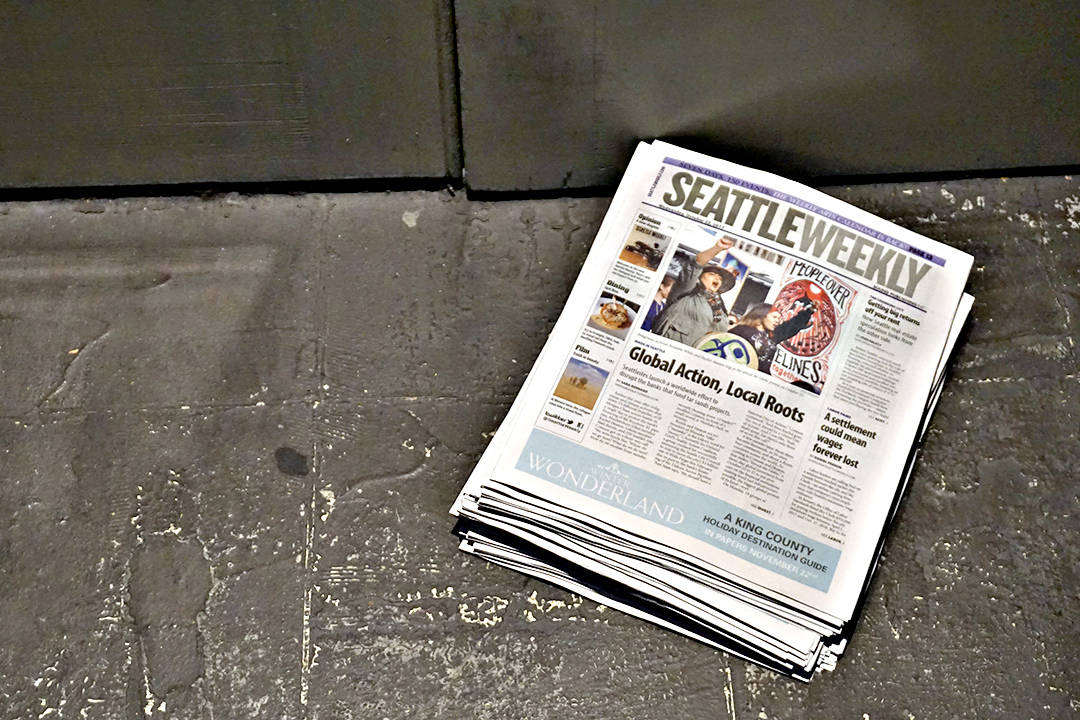It was a rub-your-eyes moment. Friday night, in the midst of a spectacular opening night event for the EMP’s newest installation, Spectacle: The Music Video, the night’s secret guest took the stage. It was Macklemore and he was, well, what was he wearing? It was a disguise, one he had been wearing since arriving at the museum, driving a limo that delivered his producer Ryan Lewis to the venue.
“I went to the costume shop and I got this nose and this beard,” he said, after performing his breakout hit “Thrift Shop” to a frenzied crowd of a few hundred holding their phones aloft in the museum’s Sky Church performance space. “I’ve never felt more like a man.”
But what, exactly, was he wearing? Costumes are no new thing for Macklemore. Earlier in his career (before he blew up), the Seattle rapper would sometimes dress in the style of David Bowie in Labyrinth
and adopt a British accent. It was schlock and it was fun. But this was something very different.
From where I was standing—near the back, behind all those phones—it seemed crystal clear. The dark beard, the hooked nose, and the cheap suit, they were all attributes of a caricature drawn to denigrate Jews throughout history. I couldn’t believe it. So I stood there and waited for clarity; for either a knowing joke that would somehow show this costume as a commentary, or a tasteless joke that would do the opposite and confirm my worst fears about this performance, that it was an antisemitic.
That clarity never came. After lavishing his fans with praise and thanks, Macklemore and his band performed another hit, “Can’t Hold Us,” before he tore off the dark wig and that craggy schnozz to reveal his blonde crop and his own Redknapp nose. Then he left the stage.
Read Macklemore’s apology, issued after the publication of this essay, here.
I immediately went to my phone and Google Image searched “Jewish caricature” to be sure, and there was that very same unmistakable image. Seattle Weekly photographer Morgen Schuler posted some images of the show without comment about the costume, but I weighed in in the comments.
“The performance was undeniably fun, but what in the world was he thinking with that ‘disguise’?,” I wrote. “Just one quick Google Image search for ‘Jewish caricature’ could have quickly quashed a very bad idea.”
I wasn’t the only one who thought so. The heat has been coming from all sides. (Look here, here, and here. Even his fellow celebrities got in on it: “first you trick people into thinking you’re a rapper, now you trick them into thinking you’re Jewish?” Tweeted Seth Rogen.
Macklemore responded last night. “A fake witches nose, wig, and beard = random costume,” he Tweeted. “Not my idea of a stereotype of anybody.”
I believe him. But I also believe this: Macklemore makes bad decisions. As I’ve stated before—much to the consternation of his very vocal fanbase—Macklemore’s decision to double-back on his social commentary was a bad decision. The Tweet that he sent to Kendrick Lamar after winning the Rest Rap Album Grammy and then made public? Bad decision. Those ugly “Northwest King Salmon” Air Jordans that now bear his name—the very same brand of shoes that he knocks down forcefully in the song “Wing$”? Bad decision.
Macklemore has made some good decisions, sure. Getting sober, resisting unfair major label deals, pairing with Ryan Lewis. All these things were integral to his success. But the guy is as prone to really bad decisions as he is to really good ones, and, apparently, he has no one around him with the gall or the presence of mind to help him avoid these pratfalls. There was no one there to look at that nose and say, “No.”
The decisions Macklemore is making are more than tasteless. They are, in a way, changing his music, twisting and adding meaning that I don’t believe he intends, meaning that is, I think, destructive.
Consider the evolution of “Wing$,” a song where Macklemore bemoans the killing of innocent kids for Air Jordans, a status symbol. When he sold the song—and re-edited the song—for the NBA All-Star Game, he declared that the NBA wasn’t part of the problem, that they weren’t the ones propping up these shoes as status symbols. Then he teamed up with the company who makes the shoes and made his own pair. Though he has not made a statement about this seeming contradiction (that I have seen, anyway), it’s hard to imagine him creating a product that he believes is responsible for kids dying. So since the NBA and the shoe company are off the hook, who is responsible? When I listen to “Wing$” now, through this twisted prism, I hear it not as an indictment of corporations inspiring belligerent consumerism. I hear it as a song about personal responsibility. Who is to blame for the kids dying in their shoes? The kids.
I don’t think this is Macklemore’s intention—and I’m sure that it can be read differently—but there is no doubt that these songs are becoming warped, that Macklemore’s core message is being tainted, twisted, and left for dead because of his poor decisions. It’s not only poor decision, though, that have changed the meaning Macklemore’s songs. The good decisions, the success, naturally has transformed his art.
Let’s look at “Thrift Shop.” When I first saw the video for “Thrift Shop”, the day it was released, it had an endeniable freshness to it; it was a bouyant song performed by a couple small-time artists talking about how it’s possible to have style without gobs of cash. Then it blew up and took Macklemore & Ryan Lewis to the tops of the charts and, because of some savvy business decisions, turned both into millionaires with gobs of cash. Now what does it mean for a millionaire to perform a song about buying piss-smelling sheets and used fur coats at a Thrift Shop? It doesn’t make sense; sure he might have $20 in his pocket, but he also has a platinum card in his wallet. It sounds like he is slumming it, like he is a tourist in the world of poverty. The song’s power has dissolved, even while its beat remains undeniable. It has become warped. But it can become even more warped.
Which brings us back to the bad decisions and the one that predicated that EMP performance on Friday night. Up on stage, dressed in a costume that was not intended to be a caricature of a miserly Jew, but to any right-minded person with an understanding of history could not be anything but, Macklemore sang his hit song.
“Savin’ my money and I’m hella happy that’s a bargain,” he rapped, again, dressed as the same caricature that has long perpetuated the stereotype of Jewish people as, among many other things, skinflints. “Bitch. Imma take your grandpa’s style, Imma take your grandpa’s style. No for real—ask your grandpa—can I have his hand-me-downs?”
Think about that. Obviously, Macklemore didn’t.
mbaumgarten@seattleweekly.com








